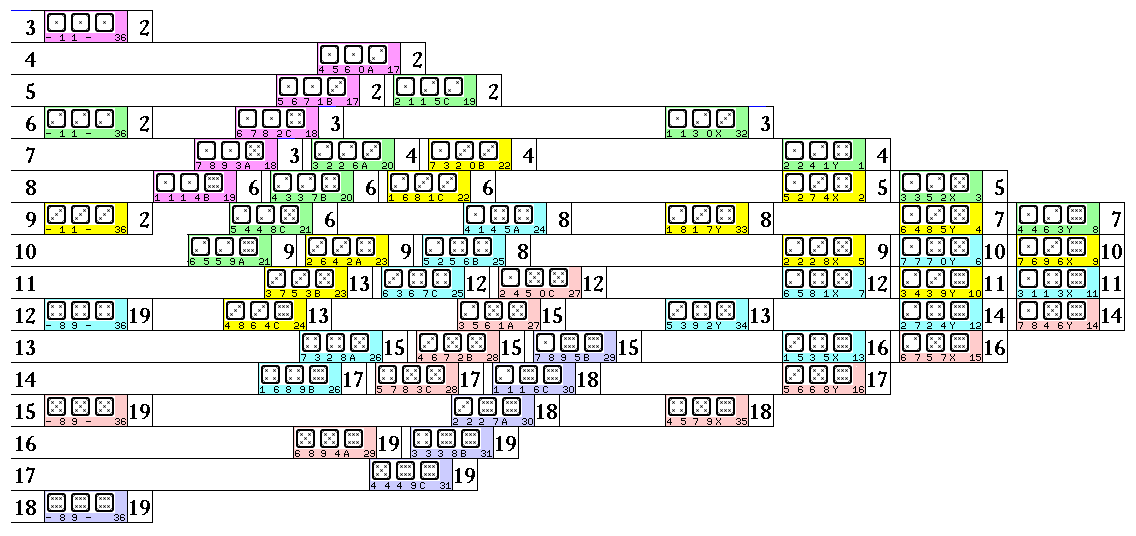
Role-playing games, generally speaking, use three six-sided dice, notated as 3d6, to roll up character abilities with a normal distribution. The total can be from 3 to 18, with 10 1/2 being the average.
To determine whether or not a character succeeds at some task, various modifying factors are added or subtracted from the relevant ability of the character, and then a 20-sided die, marked with the numbers from 1 to 20, is rolled. If the result is greater than the modified ability score, the character fails at the task; if it is less, the character succeeds.
On the previous page, we've seen how, with an extensive table, three dice, or some other combination of dice, could be made to serve as an approximate substitute for any other kind of dice.
However, since the roll of a single d20 is the most common and basic operation in a typical FRP game, if one were to propose making an FRP game that instead did not require such specialized equipment, requiring people to look in a complicated table every time they rolled a d20 would make such a game pretty much a non-starter.
Is there a very simple way to make three dice behave like a d20?
To achieve this in a very simple way, I propose to take one major shortcut. Excluding 16 of the 216 possibilities of rolling three dice, and dividing up the remaining 200 possibilities into ten parts would require three dice of different colors and would inevitably be complicated. But the roll of three dice divides easily into 36 possibilities.
Thus, instead of making three dice behave like a d20, let them behave like a d18 plus 1, producing numbers from 2 through 19, each with an equal probability. This will still require a table, but at least it can be a short and simple one.

A simple and relatively symmetrical arrangement is shown pictorially above. The same table in a simple text form is:
Total Triples Pairs Straights 1-?-4 1-?-5 1-?-6
1 2 3 4 5 6 2-?-5 2-?-6
3-?-6
3 1-1-1 2
4 1-1-2 2
5 1-1-3 2 1-2-2 2
6 2-2-2 2 1-1-4 3 1-2-3 3
7 1-1-5 3 2-2-3 4 1-3-3 4 1-2-4 4
8 1-1-6 6 2-2-4 6 2-3-3 6 1-3-4 5 1-2-5 5
9 3-3-3 2 2-2-5 6 1-4-4 8 2-3-4 8 1-3-5 7 1-2-6 7
10 2-2-6 9 3-3-4 9 2-4-4 8 2-3-5 9 1-4-5 10 1-3-6 10
11 3-3-5 13 3-4-4 12 1-5-5 12 2-4-5 12 2-3-6 11 1-4-6 11
12 4-4-4 19 3-3-6 13 2-5-5 15 3-4-5 13 2-4-6 14 1-5-6 14
13 4-4-5 15 3-5-5 15 1-6-6 15 3-4-6 16 2-5-6 16
14 4-4-6 17 4-5-5 17 2-6-6 18 3-5-6 17
15 5-5-5 19 3-6-6 18 4-5-6 18
16 5-5-6 19 4-6-6 19
17 5-6-6 19
18 6-6-6 19